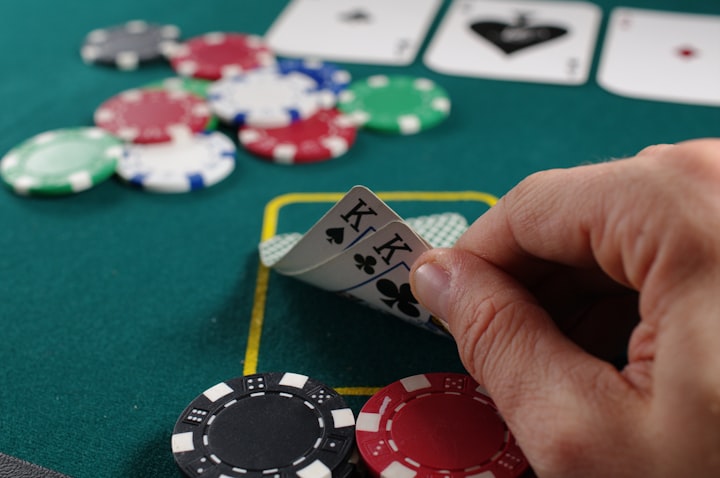How to Lose at Texas Holdem
Poker is about decisions not results.

The following is a couple examples of topics fromthe new book How to Lose at Texas Holdem
There are over 60 million poker players playing online in the US and over 100 million worldwide. Of these, the true number of professionals or those players where poker is their main source of income, is estimated to be around 5 million. That leaves about 95 million who would benefit from this book.
This book is written with amateur, social, recreational, and beginning poker players in mind. That said, it also applies to life itself. The way a player decides to play a hand or how a person makes decisions on a day-to-day basis most likely involves the same process, some sort of thinking or lack of it.
If you don’t learn anything else reading this book, remember:
POKER IS ABOUT DECISIONS NOT RESULTS.
Snap judgements, gut feelings, superstition, or I’m feeling lucky, often eliminates the thought process in Texas Holdem today. I am sorry to say that these same considerations are in play while driving drunk, diving into a swimming hole without knowing the depth of water, and today, being irresponsible when it comes to COVID 19.
I will let those far more trained and professional to worry about the thoughtless behavior that we all witness on a daily basis. My purpose is to explain in simple terms how Texas Holdem players without much more thought than usual, can continue and improve their losing ways.
I have played in many events around the world, run a poker company, and made observations of the players I have encountered. Does this qualify me to write a book on poker? Probably not. However, the years of experience as a loser gives me an insight which I am willing to share.
Much of the information included in this book can be easily found and is common knowledge. Many of the ideas, thoughts, and opinions, are mine. I do not expect everyone to agree. Many will disagree. Either way if one person learns something, just one thing, I have done my job. I have no direct intention of hurting anyone’s feelings or criticizing how they play the game. I see no way to be honest and avoid this, so if you are thin-skinned, I suggest dropping this book and getting a romance novel. Otherwise, stick with it and maybe what you read is the wake-up call you have been hoping for.
Everyone wants to be a winner even if it’s only a couple of dollars. Unfortunately, most end up losers while the same few always seem to win. It is disregarded with a shake of the head saying, ‘they are lucky’, or on occasion, ‘they are good’.
This book will endeavor to explain why some win while others practice game after game at how to lose at Texas Holdem.
From here on, I will use TH to mean Texas Holdem in most instances.
FAVORITE HANDS
Whenever you sit at a table anywhere playing Texas Holdem, you will hear someone say at least once, ‘that was my favorite hand’ or ‘it is my favorite hand’, as the chips are pushed away to another player. As an observer of this over many years, I can only think that the hand should be called something other than ‘favorite’.
Let’s first understand what we are talking about here. The definition of favorite according to the dictionary is as follows:
Preferred, chosen, ideal, special, and best loved.
Depending on the person, any two cards can be deemed as their favorite. The world’s favorite number is 7 and is also said to be the luckiest number. 10 is the least-liked number. Favorite logic would tell you that pocket 7s should be better than pocket aces and pocket tens should always fold. We all should know there is NO logic to favorite cards.
A favorite meal, a favorite team, or the favorite one-eyed Teddy Bear are constant things that don’t change with circumstances. They have longevity and seldom disappoint, thereby earning the title favorite.
When someone wins a large pot or an event with A-3 off-suit by hitting two 3s and an A, the hand A-3 becomes their favorite hand for life, and thus contributing to many years of losing. For some unknown reason, the belief never wanes.
This is only one example of how many favorite hands come about. I believe there are as many variations in finding the favorite hand as there are reasons for picking your mother’s birthday or son’s age, the number of kittens your cat has, or the number of ex-wives, as numbers to choose when filling out a lotto ticket. The only thing in common with all this is that they all lose on a consistent basis.
The following are some actual interviews with players on this subject:
“Do you have a favorite hand?” (Asked of a female)
“Yes. 8-3.”
“Why?”
“I won with it once.” (She giggled nervously)
“Have you won with it since?”
“No.”
“Do you still play it?”
“Of course!”
“Do you have a favorite hand?” (60-something male)
“6-9.”
“Suited?”
“Doesn’t matter.”
“Have you won often with it?”
“Never but I like the way they look in my hand.”
“Do you have a favorite hand?” (Male, early twenties)
“Oh Yeah, 2-2. I always play duces.”
“Do you ever win with them?”
“Not yet but I saw a guy win a big pot with them online.”
“Do you have a favorite hand?” (Lady 30+)
“Yes. Pocket Queens. I always go all-in. I play any queen.”
“Do you win?”
“Not very often.”
“Why do you continue to play them?”
“Because I like girls.”
“Do you have a favorite hand?” (Male 45)
“King-9, K9 the dog hand.”
“Have you won with that hand?”
“Six years ago, I won a big pot.”
“And you have ever won since?”
“No, but it is my favorite hand, so I always play it.”
“Do you have a favorite hand?” (Female)
“Yes, 3-4 but they have to be clubs or spades. No red cards.”
“Why is that?”
“Because I have three dogs and four cats, and they are mostly black.”
“Do you win with that favorite hand?”
“Not yet but I did when I played 3 and 5. Then one cat died, and I had to change to 3-4.”
These interviews were conducted at pub poker games. They defy logic. The fact remains there is only one favorite hand. That is the one that wins at any given time.
TELLS
A poker tell is an indication which maybe physical or verbal, which gives away information on the cards a player may be holding. An example is when a certain player gets a good hand, and he unknowingly bites his lip. Players can reveal the strength of their hands without being aware of it. These are the signs you look for in players when you first sit at a table. You must also be aware that players may act in certain ways to mislead and deceive others. Recognizing the difference takes skill.
The easiest way to learn about tells is to first look at yourself. Take a minute to examine how you act at a table and see if you are advertising tells to the others. To do this, it is important to know what to look for. Some of the most common tells are the following:
Making eye contact with your opponent or looking away. Eye contact can convey strength while looking away usually means weakness. Bluffing players usually avoid eye contact but then again it can be a ploy. The only way to be sure is to watch the behavior over a longer period of time. Some will look away from the table or at their chips. In this case, eye contact is not a tell.
Touching chips or cards is often a tell. A trembling hand by an inexperienced player often means they have strong cards. Reaching for chips before it’s their turn is also a sign that they are eager to bet. Not touching chips points to a weaker hand. Some do these moves to deceive. It takes practice and patience to watch players and the hands they play before being able to detect tells.
Engaging in table talk, using the phone, or acting too quickly are all possible tells or ploys to confuse and upset concentration. Doing a quick self-check of your personals tells and improving on your basic skills of poker should occur before trying to be an expert on spotting tells.
A lesson in what are NOT tells is also important:
• Unkempt nose hair is not a tell.
• A low-cut blouse without a bra is not a tell but may be a ploy.
• Maneuvering your chair to get a better look is called a perv.
• Pushing slightly away from the table to get a peek at an inexperienced player who doesn’t know how to protect his hand is not a tell but a cheat.
• Body odor is not a tell but it tells you something.
• A person with a habit of scratching his crotch can be telling you to change tables.
TAKING THE NEXT STEP
If you are happy with the way you approach your poker night out, there is no reason to change. You play your style and enjoy your time at the table. Winning or improving your poker skills is not your only goal. Therefore, I thank you for reading. You already know how to lose at Texas Holdem and enjoy the experience.
On the other hand, if reaching more final tables were possible, if winning an extra $30 to $50 every now and then, or a win itself is something you would like to experience, then read on.
When you invest more attention to the game without giving up the social aspects, you can improve your ability.
Below I have listed the most important points that I have covered to follow in order to improve your game.
I guarantee How to Lose at Texas Holdem will change to, ‘This game is so much more fun when I know what I’m doing’.
Remember:
POKER IS ABOUT DECISIONS NOT RESULTS:
• Play far less hands. Play far less hands. Play far less hands.
• Concentrate on others.
• Think what others maybe holding before you act.
• Forget favorite hands and preconceived notions.
• Always consider your table position in a hand.
• Play good hands. A-9, K-J, Q-10, and the like are not good cards.
• Understand the tournament structure before you enter.
• Play your cards, not the chips or your ego.
• Read this book again after two weeks.
REMEMBER, YOU MAKE YOUR OWN LUCK BY BRINGING SKILL.
Thank you for reading.
How to Lose at Texas Holdem is available at. Jack Kregas books.com
Amazon (click the underlined)
About the Creator
Jack Kregas
Jack Kregas was born in the United States. After a stint in the US Army, he was discharged in Europe where he lived for the next forty years.
He now lives in Brisbane as a full time author of 14 novels and poker player.






Comments
There are no comments for this story
Be the first to respond and start the conversation.